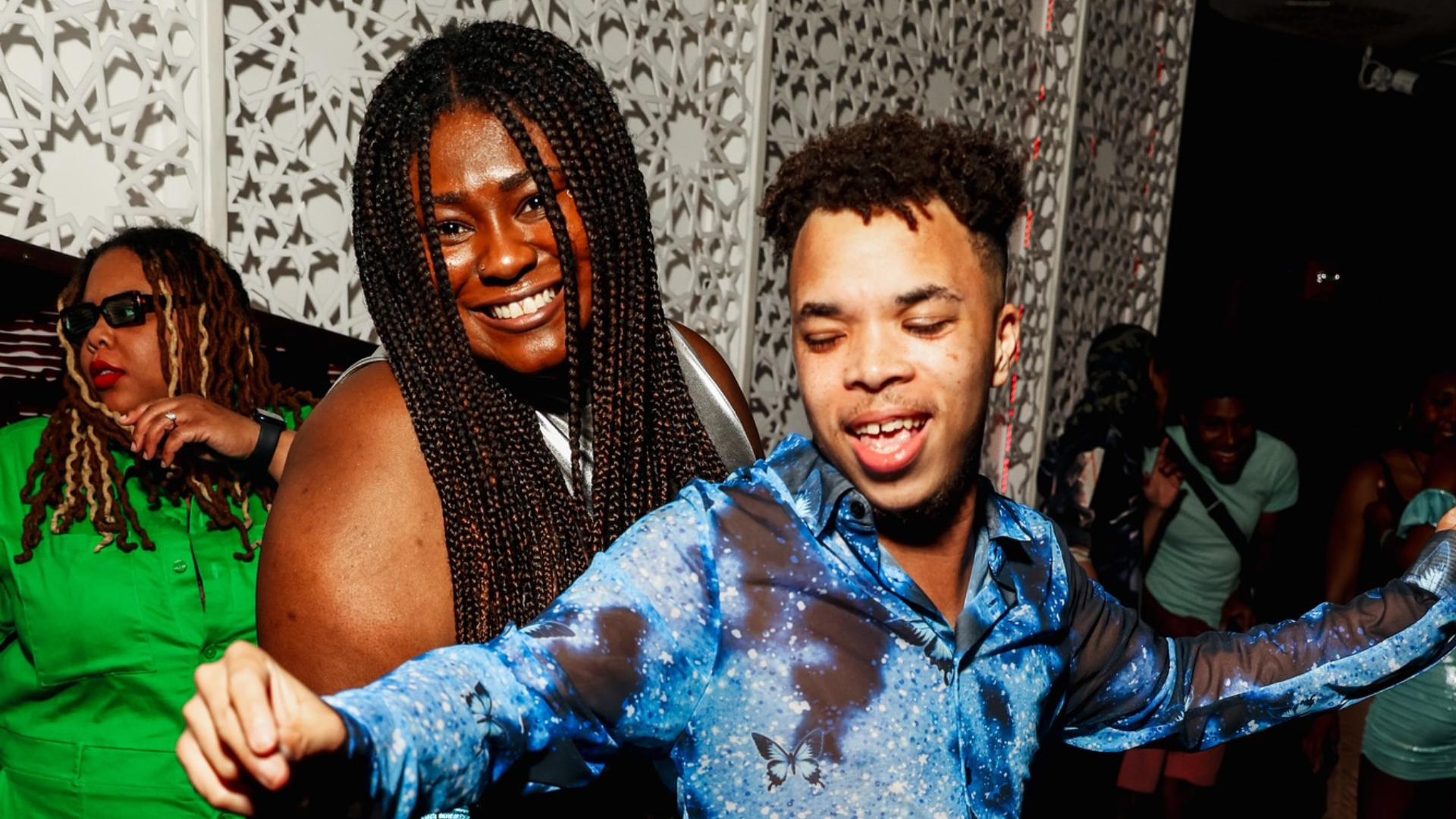
On a warm spring day, I arrived with Gabrielle Hitchens at Brunch Harlem about an hour before she hosted a burlesque party. We set up the restaurant’s basement level, removing most of the seating. As time passed swiftly, guests started to arrive. I handed out ones to them to use for the burlesque dancers, who were the last to arrive at the packed event. The attire of the skilled dancers made me think of sophisticated lingerie, similar to Dita Von Teese’s style. It was cheeky, not too forward, but suggestive.
Hues like black are given new life when seen on lengthy boudoir robes worn by one dancer. The tone of deep crimson is refreshing, too, as it appears on a two-piece lingerie set. Each individual dresses appropriately as guests ogle and applaud their athletic and sensual rhythmic dancing. What makes an impression on me is how the costuming and attire of the dancers set the stage for the immersive experience that Raw Honey, a collective by Hitchens, has been perfecting since the pandemic.
Hitchens, the founder of the Raw Honey event collective, is more than just a promoter. She’s someone who enjoys seeing friendships blossom from one small introduction in real life. Hitchens is part empath and part community leader. Through her events and parties, which began in Brooklyn, queer and trans-BIPOC folks can show up as their most authentic selves. Whether she’s hosting a cheeky burlesque event in Harlem or a Pride Month party in Bushwick where Amorphous is spinning, Hitchens is adamant about creating a variety of events for guests seeking joy. If you’re looking to enjoy an evening out with friends, new or old, Raw Honey provides that, too.
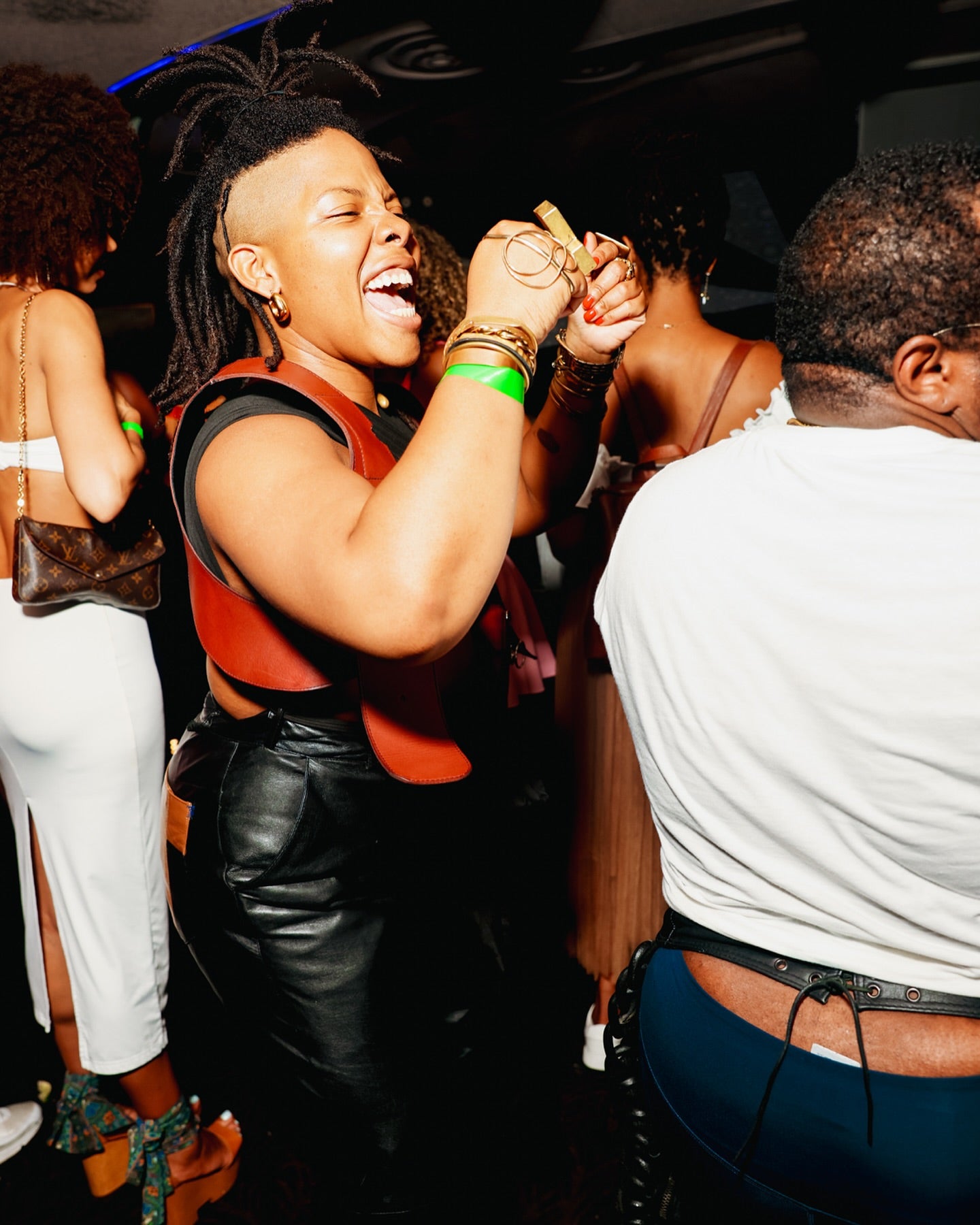
If you check out the collective’s Instagram page, you’ll see diverse attendees. Some are clad in skin-tight outfits, others are wearing streetwear, and some are decked out in femme clothing. Party attire takes many forms and that’s the beauty of the scene that was carved out specifically to provide a safe haven for those who are seeking kinship with other queer and trans people. One profound notion rings true: the collective which consists of Hitchens and her team since 2020, is dedicated to keeping their events safe and will be prioritizing safety protocols this year.
The Seeds of Raw Honey
The seeds of Raw Honey were planted years ago, when Hitchens, a native of Indianapolis, Indiana, used to host impromptu house parties in her hometown while in high school. In a phone call earlier this month, she mentioned that growing up in the Midwest had a significant impact on shaping her into the person she is today. She explained that it taught her to embrace different perspectives, regions, dialects, cultures, and experiences.
“I grew up in a more slow, traditional, Black religious household,” she said. Her father was a pastor at one point–and she has watched her mother juggle entrepreneurship while being a charismatic figure in her community in Indianapolis for decades. Due to her lineage, it’s safe to say she was built for the long hours that come with carving out a creative venture.
As Hitchens has gotten older, she’s grappled with unpacking her identity–but she also channels this earnest desire to belong into Raw Honey. She’s aware of the fact that some who relocate to New York City and Brooklyn are on the hunt for events and people they can genuinely connect with.
The Impact of Florida A&M University
Post-high school, Gabrielle attended Florida A&M University, where she studied business. What stood out to her most during her time there was the energetic and influential male promoters, such as James Highsmith and Aaron Waters. She respected not only their ability to pack parties but also their experience of interning in larger cities during breaks and their tales of their summer. It is common for students in the School of Business and Industry to intern on Wall Street, some key figures at FAMU who walked this path were also sources of inspiration for Hitchens. Highsmith and Waters went on to work in corporate roles after graduating–and she looked at this path as something to aspire to, as she had worked with both of them to promote and pack out parties.
“Seeing those same people that have these great corporate jobs and internships, but they also know how to have a good time and party [was pivotal for me].” She adds that seeing events with sponsors such as Paramount, Instagram, and other companies during homecoming amid day parties inspired her. It also gave her a vision of what she could create for the queer and trans community if she keyed in on a niche. “FAMU taught me to dream big,” Hitchens said.
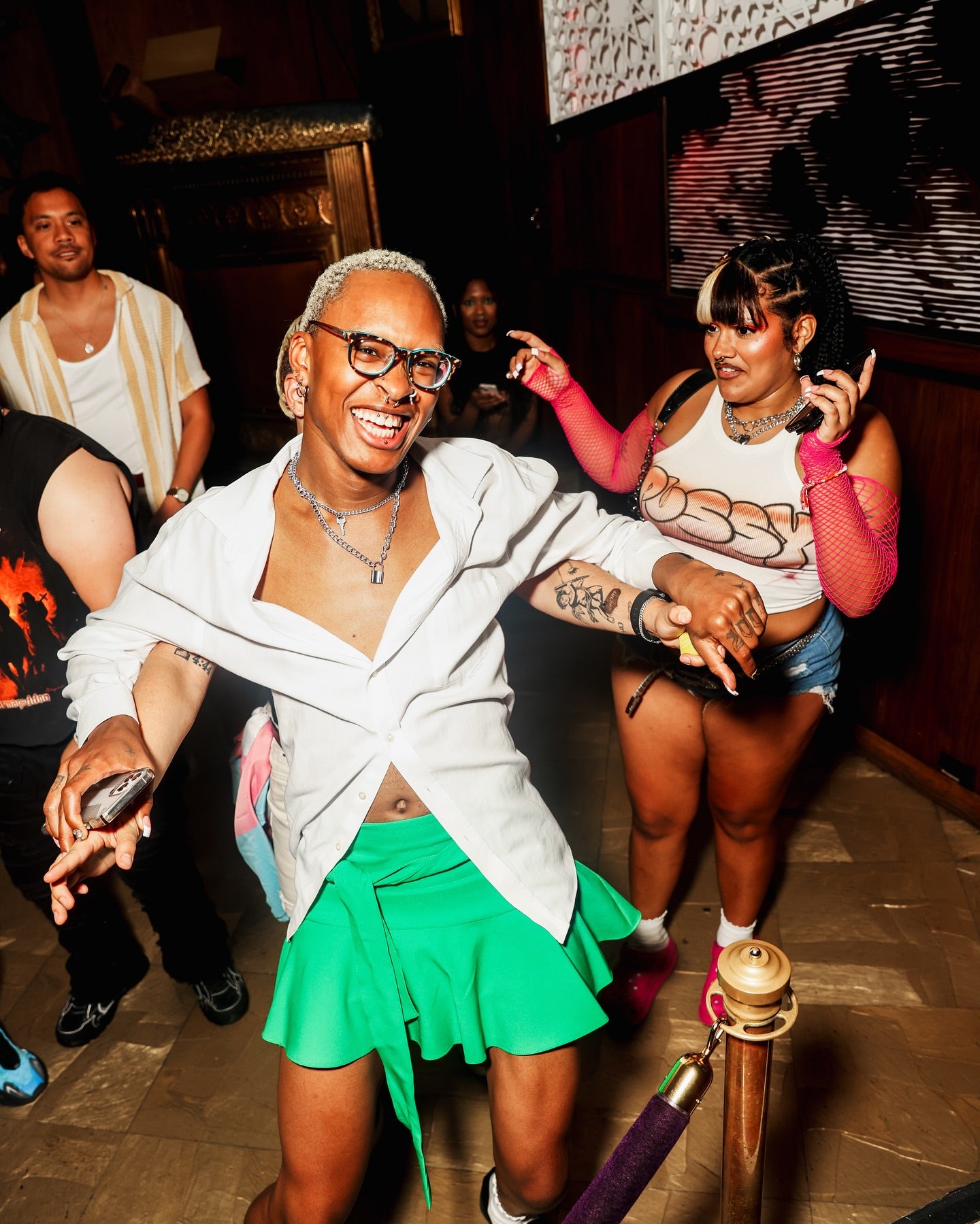
“FAMU specifically is where I just really learned my hustle from just interning with a lot of major companies,” she adds. The historically Black university pushed her in countless ways. Years later it led her to think about how she can make party experiences that she had in college relevant for her community of Black and brown queer folks.
I met Hitchens during our first week at FAMU. I was immediately drawn to her bold and confident personality, which reminded me of my twin sister. Gabrielle had an innate ability to curate memorable experiences, like a massive block party on campus during our freshman year. This block party was led by Gabrielle, Joshua Smith, who now works in marketing for the Orlando Magic, and other members of our freshman class.
The event eventually got shut down. There was music blaring from nearly every corner of the main part of FAMU’s campus in 2010, the set and there were nearly 1,000 bodies jampacked amongst one another. The high-spirited moment gave a taste of what was to come years later for Hitchens.
A Young Professional Blossoming
After graduating, Hitchens pursued a career in corporate sales for Fortune 500 companies, starting with a job at Walmart in Kansas City. Later, she moved to Molson Coors under the umbrella of Miller Lite in 2016. She then relocated to Worcester, Massachusetts in the same year and to Bentonville, Arkansas in late 2018. In each of these cities, she worked tirelessly and with great dedication. In the latter cities, she had the budget to organize happy hours to encourage barhoppers and bar owners to try out new beers by Miller Coors.
She sought community as she began identifying as a queer woman at 25. In Kansas, Massachusetts, and Arkansas, she couldn’t find people who looked like her unless she was willing to drive an hour. Even when she did, there were times when events were largely white, gay, and male. This made her think about what the happy hours she was hosting would look like if she did it for people that align more with her, other Black and brown queer individuals.
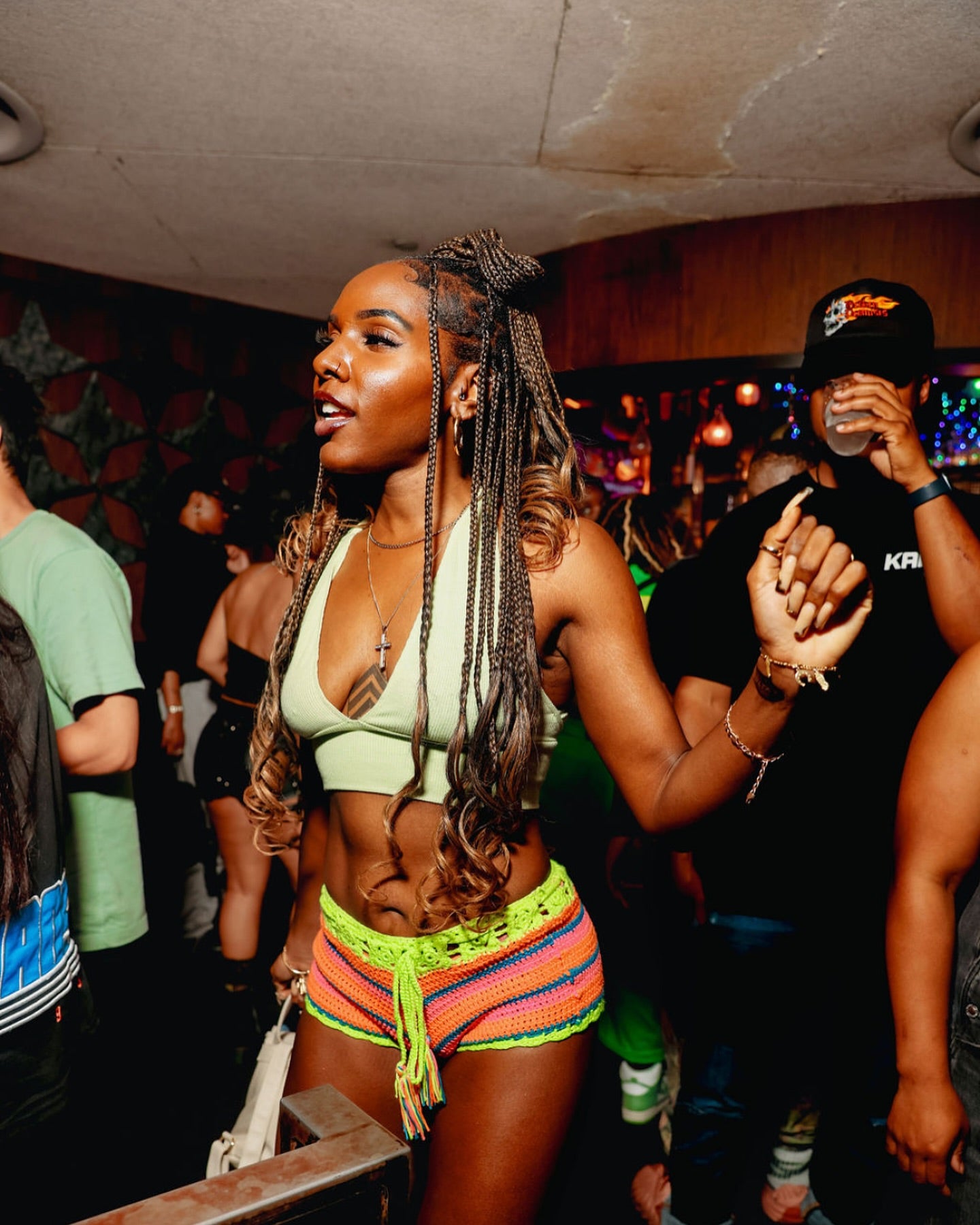
A relocation to New Jersey and then Brooklyn to continue her path working with Molson Coors in 2020 shifted things for her. She began feeling the urge to curate moments and spaces for those who identify as queer and trans. Early instances of her idea included game nights and networking events. By 2021, she had begun declaring each event under the moniker Raw Honey. “When I moved to New York, it was such a unique space because I had just lived in four or five different cities and just in those cities searching for a Black queer community. And when I moved, it was during the pandemic, so a lot of things were at a standstill,” she said. “There were a lot of organizers that had moved or that were just on pause,” Hitchens adds.
Aside from being inspired by her peers at FAMU, she says she was also driven to create experiences for those who might be socially awkward, the wallflowers who might not be comfortable enough to speak up at events but want to leave with a few new friends. “My biggest thing has just been wanting to provide variety,” Gabrielle noted.
The Birth of Raw Honey
“My vision in general is not just to create, but it’s also to create [something] that can be impactful to different communities and across different cities.” She explains that this is an idea that she is particularly passionate about.
Over the years, the business side of Raw Honey started to grow. At one point, she left a corporate role at L’Oreal to focus on Raw Honey full-time. She also took on a role at Coca-Cola while juggling event planning, ticketing, and growing the collective. Currently, she is still working at Coca-Cola. While she was a full-time entrepreneur, she accumulated a significant figure in debt running Raw Honey. This demonstrates her belief not only in herself but also in creating a space for marginalized individuals who are overlooked in gay and queer scenes in other parts of New York City.
“The mission is to be able to build community and also make an economic impact in different cities by showcasing representation and different talent,” Hitchens said. This feat is done on behalf of herself and the small but mighty team she works with–at times the number of folks she hire fluctuates depending on Raw Honey’s needs. Hosts, DJs, and a rotating flee of folks are paid by Hitchens–she says that this has allowed her to pay large increments to Black creatives.
At times, she works with emerging DJs who may not have had their first gig yet. She prioritizes this because she believes that giving them a platform to be seen and grow is very important. A few years ago, she curated a day of programming in Greenwich Village, where she featured DJs. Durand Bernarr performed during her dedicated stage time, and the entire day was filled with exuberant and joyful energy.
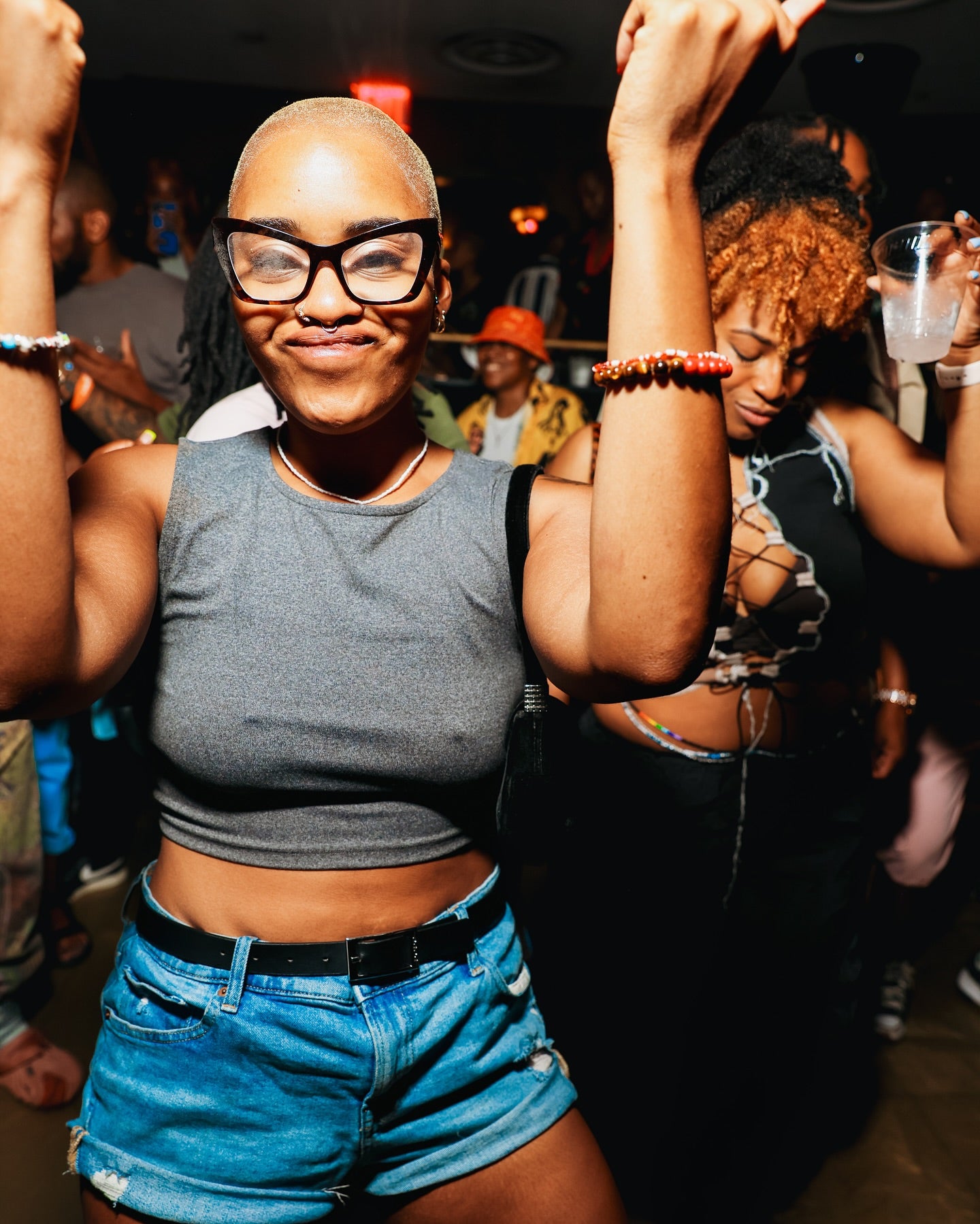
She spearheads about eight events during New York City’s Pride Month festivities each year. Later this month, she will host six events under her coined moniker “Queerpalooza.” This will include a kickoff event on June 26, a Southern-themed party on June 28, a day party and a late-night leather party on June 29, and an age-restricted day party. The final festivity will take place on June 30th.
This year she was also able to branch out and host a Cowboy Carter-themed party in Atlanta and New York City. “We’ve done some wellness events from just pick up basketball to a spin class at Equinox and then a few different workout classes at Outbox NYC, which is a trans-owned and operated gym too.” Wellness and having fun are what she has focused on in the past, she aims to continue doing so in the future.
To Hitchens declaring herself as a Black lesbian woman is pivotal to her life journey. She tells me she’s had to rework and rehash what it means to identify within these intersections. Gabrielle feels these complexities allow her to showcase her creative outlets outside of the corporate roles she’s had over the years. “The intersections of my identity are so unique and complex. At the same time, I feel like that’s what makes me fun and unique.”
Creating Impactful Spaces
Earlier in our conversation, it hit me that though Hitchens has a business background, New York City nightlife has rapidly changed in recent years. Even with her strategizing and her unique acumen to generate ticket sales, she admits at times it is tough to stay motivated. She says this is largely due to how she feels queer and trans folks are up against so much.
Gabrielle is driven by the lack of spaces for those who are marginalized–but she also firmly believes her community deserves quality spaces and experiences. “There’s a reason why there is a major gap between Black and Brown queer nightlife and White gay nightlife and Black gay men. There’s a reason why, and for all the QTBIPOC organizers and myself that are trying to fill that void, it’s hard.”
To push against the gap she sees she always aims to keep her ticket prices accessible. Even if she has to use her own money to pay deposits on venues, and to pay talent such as DJs or hosts, she believes that it’s worth it, so she makes the investment time and time again. Last year she says she was able to pay six figures to creatives in Brooklyn who worked on behalf of Raw Honey. She tells me she hopes to pay these creatives more this year.
“I’m very confident in what I can do when I set my mind to something. So, I’m excited for the journey, but it’s very rocky.” Hitchens already has her eyes set on Los Angeles, Atlanta, Houston, and other cities for Raw Honey events.